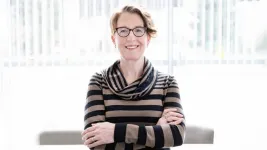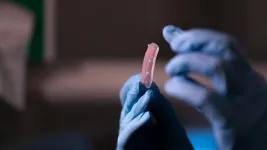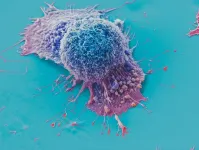(Press-News.org) SAN FRANCISCO—April 18, 2024—The American Association for the Advancement of Science (AAAS), one of the world’s largest general scientific societies, has elected Gladstone Senior Investigator Katie Pollard, PhD, into its new class of AAAS Fellows, a lifetime honor within the scientific community.
AAAS recognized Pollard for her “distinguished contributions to the field of computational biology and bioinformatics, particularly her discovery of Human Accelerated Regions, and development of open-source software for gene expression, comparative genomics, and microbiomes.”
“This year’s class embodies scientific excellence, fosters trust in science throughout the communities they serve, and leads the next generation of scientists while advancing scientific achievements,” says Sudip S. Parikh, PhD, AAAS chief executive officer and executive publisher of the Science family of journals.
Pollard—who also serves as director of the Gladstone Institute of Data Science and Biotechnology, a professor in the Department of Epidemiology and Biostatistics at UC San Francisco, and a Chan Zuckerberg Biohub investigator—leads teams of scientists who develop statistical and computational methods to decode how genomes work, evolve, and break in disease. By analyzing massive sets of genomic and epigenomic data, Pollard and her teams have gained a greater understanding of human genetic variation, what makes humans unique compared to other species, and genomic diversity of the human microbiome.
“I’m honored to be named an AAAS Fellow, joining the ranks of some of the most noted scientists in history,” Pollard says. “I’m very much aligned with the AAAS mission to advance science and serve society, which is what we’re doing every day in the lab and as we collaborate with our peers.”
Pollard also is an elected member of the National Academy of Medicine and a fellow of the California Academy of Sciences, among many other honors and awards.
In a landmark study published last year in Science, Pollard and her team analyzed how stretches of DNA called human accelerated regions (HARs) vary between humans and chimpanzees. HARs are nearly identical among all humans, but are different in all other mammals and therefore thought to confer human-specific traits. Through machine learning and lab experiments, they found that these human-specific structural changes in the genome may have created the right environment for HARs to evolve quickly in the human ancestor, after remaining almost the same over millions of years of mammal evolution.
Most recently, a team led by Pollard received a major grant from the Biswas Family Foundation to create the Biswas Center for Transformative Computational Cancer Biology, where scientists will fuse powerful machine learning with cutting-edge experimental technologies to help identify and prioritize new research avenues for cancer diagnosis and treatment. As with most of Pollard’s work, findings will be freely shared with the scientific community to accelerate global research.
“Gladstone congratulates Katie on this major and well-deserved career achievement,” says Gladstone President and Senior Investigator Deepak Srivastava, MD. “Katie’s groundbreaking work in computational biology, artificial intelligence, and genomics has moved us closer to understanding the root causes of disease and how to address them. We’re excited for all the discoveries yet to come.”
With the addition of Pollard, Gladstone now has seven AAAS Fellows; the others are Sanders “Sandy” Williams (1992), Robert Mahley (1998), Warner Greene (2004), Jennifer Doudna (2008), Srivastava (2011), and Katerina Akassoglou (2021).
The latest class of AAAS fellows is comprised of 502 scientists, engineers, and innovators across 24 AAAS scientific disciplines, from biological sciences and chemistry to neuroscience and physics. Fellows will receive a certificate and a gold and blue rosette pin (representing science and engineering, respectively) to commemorate their election and will be celebrated in Washington, D.C., on September 21.
A tradition dating back to 1874, the AAAS Fellows program has recognized over the years notable scientists such as W.E.B DuBois, Maria Mitchell, Steven Chu, Ellen Ochoa, Irwin M. Jacobs, Alan Alda, Mae Jemison, and Ayanna Howard.
About Gladstone Institutes
Gladstone Institutes is an independent, nonprofit life science research organization that uses visionary science and technology to overcome disease. Established in 1979, it is located in the epicenter of biomedical and technological innovation, in the Mission Bay neighborhood of San Francisco. Gladstone has created a research model that disrupts how science is done, funds big ideas, and attracts the brightest minds.
END
Computational biology pioneer Katie Pollard elected as AAAS fellow
The American Association for the Advancement of Science (AAAS), one of the world’s largest scientific societies and publisher of the Science family of journals, will celebrate its new class of fellows in the nation’s capital later this year.
2024-04-18
ELSE PRESS RELEASES FROM THIS DATE:
New “window-of-opportunity” clinical trials explore cutting-edge treatments for cancers of the liver, head and neck
2024-04-18
April 18, 2024, TORONTO – A new round of clinical trials supported by the Ontario Institute for Cancer Research (OICR) will harness a unique opportunity to test some of the newest treatment strategies for a range of different cancers.
OICR has announced two new clinical trials as part of its Window-of-Opportunity (WOO) Network, which brings together Ontario researchers, clinicians and patients to study the biology of newly diagnosed and recurrent tumours.
“‘Window-of-opportunity’ clinical trials take advantage of the two-to-eight-week period between the diagnosis of cancer and the surgery to remove the cancer, at ...
Can bismuth prevent oil leaks – (and save Norwegians billions)?
2024-04-18
Over the next 25 years, as the world shifts away from fossil fuels, the oil and gas wells that have sustained the fossil fuel age will have to be plugged.
No big deal, you might think, drilling those wells was the hard part. Plugging them should be no problem. But think again.
The Norwegian Continental Shelf, as an example, is punctured by more than 2000 wells. Harald Linga, centre director for SWIPA (see box), a Centre for Research Based Innovation based at SINTEF, Scandinavia’s largest independent research institute, estimates that plugging them using today’s technology will cost upwards of NOK 800 billion – that’s USD 73 billion.
And while oil ...
Atmospheric isotopes reveal 4.5 billion years of volcanism on Jupiter’s moon Io
2024-04-18
Sulfur and chlorine isotopes in the atmosphere of Jupiter’s moon Io indicate that it has been volcanically active for the entire 4.57 billion-year history of the Solar System, according to a new study. The findings offer new insights into the moon’s history. Io is the most volcanically active body in the Solar System. This extreme level of volcanic activity is the result of tidal heating from friction generated within the moon’s interior as it is pulled between Jupiter and its neighboring moons of Europa and Ganymede. However, how long Io has hosted such extensive ...
An ink for 3D-printing flexible devices without mechanical joints
2024-04-18
For engineers working on soft robotics or wearable devices, keeping things light is a constant challenge: heavier materials require more energy to move around, and – in the case of wearables or prostheses – cause discomfort. Elastomers are synthetic polymers that can be manufactured with a range of mechanical properties, from stiff to stretchy, making them a popular material for such applications. But manufacturing elastomers that can be shaped into complex 3D structures that go from rigid to rubbery has been unfeasible until now.
“Elastomers are usually cast so that their composition cannot be changed in all three dimensions over short length scales. To overcome ...
Association for Chemoreception Sciences (AChemS) 46th Annual Meeting
2024-04-18
Media Contact:
Dr. Alissa Nolden, Chair - Public Information & Affairs Committee, anolden@umass.edu
Bonita Springs, FL— The Association for Chemoreception Sciences (AChemS) stands as a premier organization dedicated to advancing the understanding of chemosensory systems. With a rich history spanning over four decades, AChemS has played a pivotal role in fostering interdisciplinary research and collaboration in the fields of taste, smell, and chemical senses. AChemS provides a platform for scientists, clinicians, and industry members from diverse backgrounds to exchange ideas, present cutting-edge research findings, and address pressing challenges ...
How the Birmingham Drug Discovery Hub created an investment-ready ‘drug library’
2024-04-18
A novel approach to drug discovery is enabling University of Birmingham researchers to overcome the ‘valley of death’, where projects fail due to the funding gap between original research and commercial investment.
The approach, detailed in a feature published in the April issue of Drug Discovery Today, has attracted more than £4m in industry funding, grants and industry awards, on the back of just £0.2m investment from the University’s Dynamic Investment Fund (DIF).
The Birmingham Drug Discovery Hub ...
Scientists uncover 95 regions of the genome linked to PTSD
2024-04-18
In posttraumatic stress disorder (PTSD), intrusive thoughts, changes in mood, and other symptoms after exposure to trauma can greatly impact a person’s quality of life. About 6 percent of people who experience trauma develop the disorder, but scientists don’t yet understand the neurobiology underlying PTSD.
Now, a new genetic study of more than 1.2 million people has pinpointed 95 loci, or locations in the genome, that are associated with risk of developing PTSD, including 80 that had not been previously identified. The study, from the PTSD working group within the Psychiatric Genomics Consortium (PGC - PTSD) together with Cohen ...
AI tool predicts responses to cancer therapy using information from each cell of the tumor
2024-04-18
With more than 200 types of cancer and every cancer individually unique, ongoing efforts to develop precision oncology treatments remain daunting. Most of the focus has been on developing genetic sequencing assays or analyses to identify mutations in cancer driver genes, then trying to match treatments that may work against those mutations.
But many, if not most, cancer patients do not benefit from these early targeted therapies. In a new study published on April 18, 2024, in the journal Nature Cancer, first author Sanju Sinha, Ph.D., assistant professor in the Cancer Molecular Therapeutics ...
CEOs’ human concern translates into higher stock price
2024-04-18
Compassionate leadership has tangible benefits: CEOs’ expressions of empathy correlate with positive stock performance, a study led by the University of Zurich shows. The researchers analyzed data from conference calls between CEOs and financial analysts during the COVID-19 pandemic.
The COVID-19 pandemic prompted an unprecedented financial crisis. Between 24 February 2020, and 20 March 2020, the value of U.S. companies on the stock market decreased significantly, surpassing the decline during the 2008-2009 financial crisis.
At the onset of the pandemic, several CEOs made statements ...
Smoking-related deaths could be reduced if people attending lung cancer screening are offered stop-smoking support
2024-04-18
A new study has found that by offering stop smoking support as part of the national lung cancer screening programme, there is potential to save lives, and dedicated funding must be considered by policy makers.
The results of the study, published in the European Respiratory Journal, showed that offering stop smoking support at the same time and in the same place as lung screening, resulted in a high uptake of support across a range of demographic characteristics.
This has the potential to reduce smoking-related illness and death in a high-risk ...
LAST 30 PRESS RELEASES:
DGIST identifies “magic blueprint” for converting carbon dioxide into resources through atom-level catalyst design
COVID-19 vaccination during pregnancy may help prevent preeclampsia
Menopausal hormone therapy not linked to increased risk of death
Chronic shortage of family doctors in England, reveals BMJ analysis
Booster jabs reduce the risks of COVID-19 deaths, study finds
Screening increases survival rate for stage IV breast cancer by 60%
ACC announces inaugural fellow for the Thad and Gerry Waites Rural Cardiovascular Research Fellowship
University of Oklahoma researchers develop durable hybrid materials for faster radiation detection
Medicaid disenrollment spikes at age 19, study finds
Turning agricultural waste into advanced materials: Review highlights how torrefaction could power a sustainable carbon future
New study warns emerging pollutants in livestock and aquaculture waste may threaten ecosystems and public health
Integrated rice–aquatic farming systems may hold the key to smarter nitrogen use and lower agricultural emissions
Hope for global banana farming in genetic discovery
Mirror image pheromones help beetles swipe right
Prenatal lead exposure related to worse cognitive function in adults
Research alert: Understanding substance use across the full spectrum of sexual identity
Pekingese, Shih Tzu and Staffordshire Bull Terrier among twelve dog breeds at risk of serious breathing condition
Selected dog breeds with most breathing trouble identified in new study
Interplay of class and gender may influence social judgments differently between cultures
Pollen counts can be predicted by machine learning models using meteorological data with more than 80% accuracy even a week ahead, for both grass and birch tree pollen, which could be key in effective
Rewriting our understanding of early hominin dispersal to Eurasia
Rising simultaneous wildfire risk compromises international firefighting efforts
Honey bee "dance floors" can be accurately located with a new method, mapping where in the hive forager bees perform waggle dances to signal the location of pollen and nectar for their nestmates
Exercise and nutritional drinks can reduce the need for care in dementia
Michelson Medical Research Foundation awards $750,000 to rising immunology leaders
SfN announces Early Career Policy Ambassadors Class of 2026
Spiritual practices strongly associated with reduced risk for hazardous alcohol and drug use
Novel vaccine protects against C. diff disease and recurrence
An “electrical” circadian clock balances growth between shoots and roots
Largest study of rare skin cancer in Mexican patients shows its more complex than previously thought
[Press-News.org] Computational biology pioneer Katie Pollard elected as AAAS fellowThe American Association for the Advancement of Science (AAAS), one of the world’s largest scientific societies and publisher of the Science family of journals, will celebrate its new class of fellows in the nation’s capital later this year.



